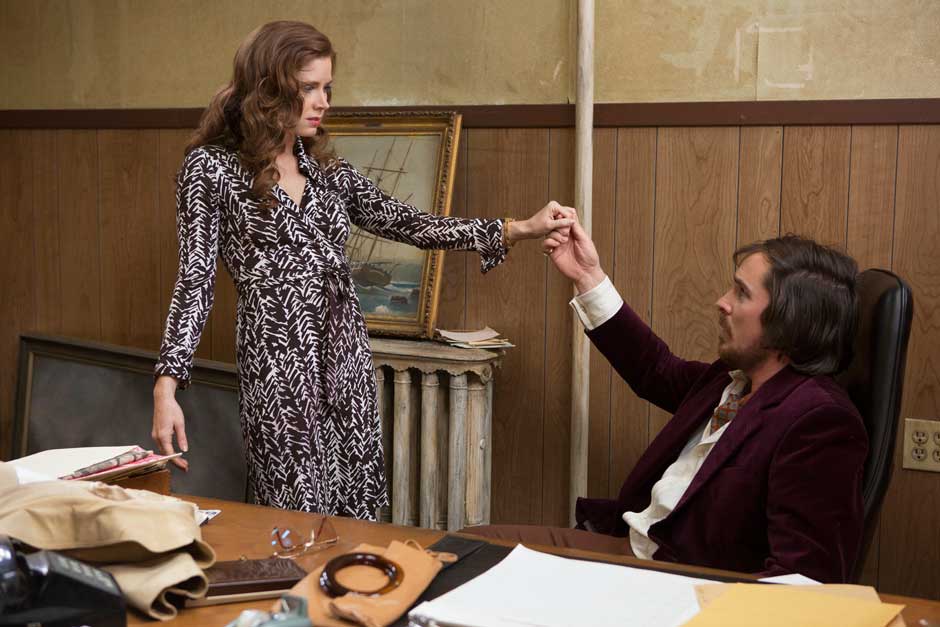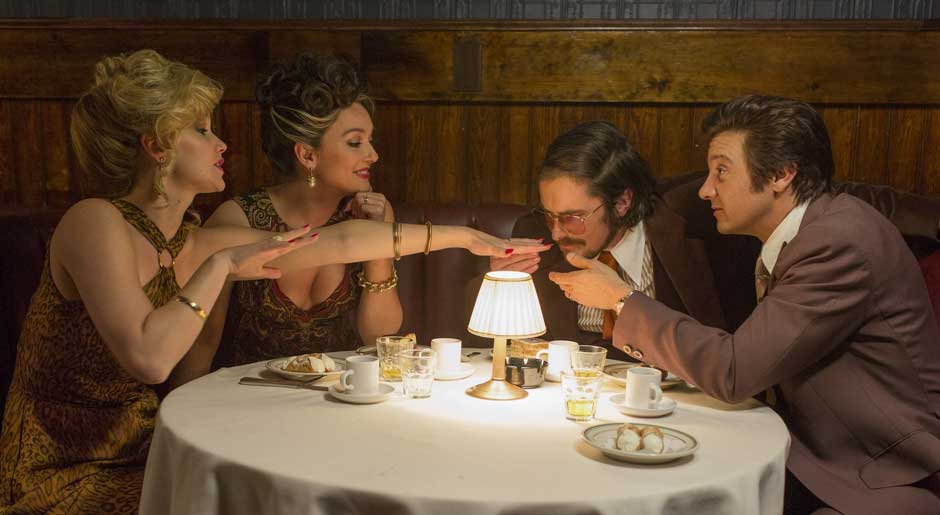American Hustle declares what it is about with disarming bluntness. The two con artists around whom it revolves confide to us in voice-over right at the start: Sydney (Amy Adams), aka Lady Edith Greensley, wanted “to become anyone else other than who I was.” Irving (Christian Bale) acknowledges that “we even con ourselves.” What could be more guileless than such flat-out admissions? With the juxtaposition of two unrelated fragments, David O. Russell has already established the key in which the movie is to be pitched: the opening bars of Duke Ellington’s 1956 Newport Jazz Festival recording of “Jeep’s Blues” and the spectacle of Christian Bale at the mirror putting a toupee in place with almost devotional attentiveness before combing over it with equal care, to face the world in the guise of a sophisticated operator of the late 1970s, complete with tinted glasses, silk scarf, and burgundy velvet jacket and vest. The Ellington speaks of an unattainable ideal of style and verve; Bale’s get-up has the eloquence of a heartfelt if not quite adequate effort to create an image worthy of that ideal.
In the prelude Bale recounts how he met Adams and found “that thing where you just want to be with the one person all the time.” It’s a romantic fantasy perfectly realized, from the scene where he woos her by giving her designer dresses (abandoned by customers at the string of dry cleaners he owns) to the dreamy shot of the two of them racing in madcap exhilaration across Park Avenue. This movie-within-a-movie has its own inner arc. Madly in love with Adams, Bale takes her to the office where he conducts his main business, a scam operation involving nonrefundable fees for obtaining fake loans; she appears troubled and walks out; alone, he surrenders to despair; a moment later she comes back and, with her exquisitely phony British accent, makes clear she will be his partner. The whole episode is deeply moving and we’re only minutes into the picture. We’re sold, like one of their marks, on the sincerity and reliability of this love in a world otherwise not to be trusted.
Bale and Adams are professional swindlers; the opening scene finds them at the Plaza Hotel in the middle of two tangles at once, a triangle situation involving an emotionally stormy FBI agent (Bradley Cooper) and a drama of surveillance and entrapment. This latter will turn out to be a simplified and fictionalized version of that great epic of fraudulence known as Abscam, the sting operation that in 1980 offered television viewers a variety show of cluelessly corrupt politicians, drawn by the promised millions of a non-existent oil-rich Arab, taking bribes before candid FBI cameras.
The Abscam saga, approached in a more documentary fashion, might have lent itself to a different sort of film, a more rancid and certainly more complicated journey into a world of pure chicanery, with a designated thief—the consummate con man Mel Weinberg—coerced by the FBI into planning and executing the ultimate hustle, bringing down a senator, a New Jersey mayor, and a raft of Congressmen. The details are to be found in Robert W. Greene’s recently reprinted The Sting Man: Inside Abscam (1981), a book richly informed by the recollections and opinions of Weinberg: “It’s nervous work bein’ a con man. You spend a lotta time sittin’ in your hotel room just waitin’. Most of the time you’re waitin’ for the mark to bring the money… After a while, I learned to turn on the TV.…I know a lotta con men are the same way. Sometimes, just watchin’ TV you learn somethin’ that can help with a con, so it’s not a complete waste of time.”
Although Russell and screenwriter Eric Warren Singer have created an artful collage from the most amusing elements of Abscam, they show no interest in dredging through the clutter or assessing the moral conundrums of that multipronged operation and, by the end of the film, it becomes only one plot strand among many. They have used it as the main ingredient of a dish also flavored with other bits of 1970s culture, from orgiastic disco clubs to the doctrines of self-help guru Wayne Dyer. The mere artifacts of the 1970s have at this point become so identified with comical self-delusion and self-display that they scarcely need further elaboration. Every detail of personal grooming is a joke in itself. The con games of Bale and Adams easily become metaphors for a wider illusoriness.
Nothing here—from Bradley Cooper’s crazy love for Adams to the grand political ambitions of the sublimely well-cast Jeremy Renner as the big-hearted and thoroughly corrupt mayor of Camden—has anything real to stand on. The FBI agent wears his hair in curlers to jazz up his otherwise straight-arrow appearance. Jennifer Lawrence, as Bale’s depressed and manipulative wife, is obsessed with a nail polish that carries a remote whiff of decay: “The best perfumes in the world, they’re all laced with something nasty.” The film’s central moment, as con artists, Feds, politicians, and Mafiosi converge in an atmosphere of exuberant fakery at a gala in an Atlantic City casino-to-be, is underscored by the Bee Gees’ lush and maudlin ballad “How Do You Mend a Broken Heart?”
Advertisement
The film might best be described as a comedy with music, and at times comes close to crossing over into an out-and-out musical. Bale and Adams fall in love to the strains of Duke Ellington, and dance while Jack Jones croons “I’ve Got Your Number”; the hapless Cooper pursues his doomed amour fou as Donna Summer chants “I Feel Love” at Studio 54; Lawrence lip-syncs “Live and Let Die” in close-up as she boils with rage against her cheating husband; Bale and Renner seal their newfound friendship by singing along with Tom Jones on “Delilah.” The steady stream of Chicago, America, Elton John, Santana, Steely Dan, and Jeff Lynne tracks sometimes gives the impression of a Top 40 station playing permanently, inescapably, in the background of everyone’s personal drama—an impression quite faithful to the texture of urban life in the 70s.
American Hustle slides with such grace through its intrigues, slipping in so many diverting props and devices and walk-ons that you may start to feel you’re being hustled by the film itself: the fish tank in the cramped apartment where Cooper lives with his mother, the interminable anecdote about ice-fishing that Cooper’s FBI boss (Louis C. K.) never quite gets done relating, the Mexican appointed to play the role of the Arab, the angry women outside the bathroom stall at the disco where Adams is slickly fending off Cooper’s passion, the cat photographs that the FBI employee in charge of wire transfers posts on her office wall, the exploding microwave that Lawrence calls “the space oven.” It’s the classic con man’s tactic: keep talking and keep changing the subject whenever necessary, and make sure the mark can never quite put all the pieces together. If so, it’s a hustle of the pleasant sort that can be savored even while you know you’re being conned.
Surfaces are all we have. As the film progresses, more than one doubt will emerge as to how much the great love between Bale and Adams can be trusted: but the trust is there, carefully planted. Christian Bale and Amy Adams are so consummately charming in their very different ways, so adept at finding ways to convey frankness and open-heartedness, that it would hurt to lose all faith in them. Bale creates a fantastically rich and detailed comic character who operates at all times on multiple levels. He persuades us that he loves and suffers and is fearful just like anyone else, that he is at the mercy of his controlling but sexually irresistible wife but he cannot live without his adored mistress, that he agonizes over the wrong he is doing to the mayor he helps to indict; at the same time he has already demonstrated how easily he could have been play-acting all the while. American Hustle remains a feel-good movie even as it pares to the minimum what there is to feel good about: Bale’s final voice-over invokes nothing more than “the story of survival,” a story that would put all the cops, crooks, and dazed onlookers pretty much in the same boat. But—in what is perhaps the triumph that every con man plays for—we choose to believe him, and to believe in her, because after all one must believe in something, if only in the music of Duke Ellington that links them together.




